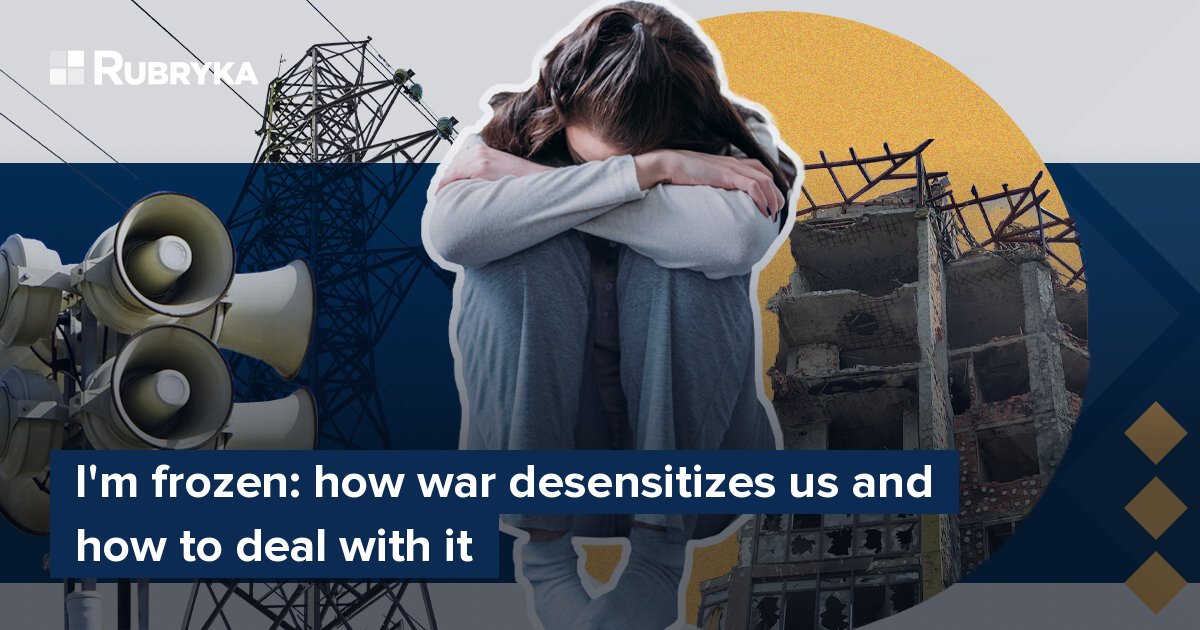
What is the problem?
Indifference to news about yet another tragedy, zero emotions, and a feeling of being frozen. If this is about you, you've experienced emotional numbness — the shutting down of emotions and feelings as a response to chronic stress.
Psychologists claim that emotional freezing is normal, like any reaction to an extreme situation. However, allowing oneself to finally fall into psycho-emotional anabiosis is not the best decision. How to "thaw" and why it is for us, we talked with Myroslava Morykon, psychologist and psychotherapist working in the method of positive psychotherapy.
What is the solution?
Before the full-scale war, we were unprepared for the pain that war brought us. Our pain threshold was much lower. But with each piece of news and tragedy, our resistance to emotional pain grows.
Everything has a limit. When there are so many negative emotions that the psyche can no longer process them, protective mechanisms are activated for survival. Emotional freezing is a manifestation of one of the types of the stress response: fight or fight. The protective shutdown mechanism works regardless of whether you are in Ukraine or have left for a safe place. Whether you are fighting or volunteering, you have witnessed a disaster or suffered in it yourself.

What happens to the psyche in such a state?
Emotional "hardening," the so-called psychological anesthesia, resembles partial freezing. You feel wooden and insensitive. This is expressed in a decrease in the intensity of emotions and sensations or a certain clouding. And this, Myroslava Morykon once again reminds, is a normal reaction to severe stress and the repeated upheavals we have to live through daily. Such a reaction of the psyche to traumatic events is designed to preserve mental health. People often say they are used to war, sirens, and tragedies. What happens to the psyche when this "habit" appears?
When some threatening or unpleasant situations happen, the amygdala is activated in the brain. It works like an alarm on a car. Its function is to inform the body about danger. A large amount of adrenaline is released into the blood, which forces the body to do something to protect itself from danger. But one dangerous situation happens, then a second, third, and the amygdala gets used to it. And the body gets used to a large amount of adrenaline. It becomes the norm.

What is wrong with this state?
On the one hand, this reaction contributes to "energy conservation" and can allow one to survive the war relatively painlessly. However, safety still prevails. Let us compare how people cared about their own safety at the beginning of the full-scale war and how often they neglect it now. How quickly we all ran for cover after the first sirens and how we continue to walk the streets during air raids now.
Also, "freezing" makes us insensitive, thick-skinned, and callous. Not only negative emotions are blocked, but also positive ones. After all, during a stressful situation, the psyche does not choose what to block, so it blocks everything. Life begins to resemble unsalty food.
We lose our ability to empathize, sympathize, and sympathize. And this negatively affects all areas of life: work, studies, and relationships.
As with unpleasant emotions, we will be unable to feel good ones — love, joy, inspiration, and hope. And they are just as necessary for survival and lust for life.
In addition, it is worth remembering that frozen emotions are stored in the body and often manifest in psychosomatics.
How to restore emotional sensitivity?
After the war's end, the majority's emotional sensitivity will be restored, says Myroslava Morykon. Some people may develop post-traumatic stress disorder and need specialist help, including re-sensitivity. But most can handle it on their own. However, it is worth paying attention to the fact that the younger a person is, the more impact traumatic events have on him. Therefore, it is crucial to protect children from trauma.
Tips for "defrosting"
- Try to make yourself feel. Listen to music, and watch videos or movies that will make you cry and release emotions, not because of grief but because of hope. Something people feel when they see goodness, mutual help, love, and tenderness. Also, you should not shy away from humor now but rather the opposite. There are a lot of jokes and memes about everything that is happening that help and support. Rewatch your favorite time-tested comedies.
- You can regain sensitivity and, with it, the taste for life through the body and its senses: sight, hearing, smell, taste, and touch. Look at something beautiful — the sunset or nature, decorate your home corner, visit an exhibition, listen to the sound of the ocean or your favorite music, bake fragrant pastries, or buy aroma oil.
- Move, touch something consciously, and increase tactile contact with loved ones. Taste your favorite dish, take a warm bath, and pet the cat. Look for something that makes you happy. Through these emotions, all others can be restored because emotions can be turned off and on with one button.
- It is very important not to close in on yourself but to maintain communication with others because it is through contact that we experience emotions. You should talk Talk about your condition with someone. You have nothing to be ashamed of. You'd be surprised how many people feel the same way.
- Talking to children and teenagers about their experiences and emotions is important. Help them verbalize them because children do not always understand what is happening to them. Our task is to introduce them to their inner world. For example: "I thought you were upset. Do you want to tell me why?", "You have been silent lately. I worry about you. Do you want to talk about something that worries you?". It is essential to accept all their emotions and confirm that they are normal. And that it's normal to feel that way.

All the answers are within us. Try to remember what helped you cope with stress and feel happy in pre-war times. What did you enjoy? You should have a list of resources that will remind you of a peaceful time, evoke pleasant memories and emotions, and support your psyche during this difficult time. And remember: you are okay.
Even more helpful solutions
Frozen state: advice from psychologists
Most often, psychologists receive complaints that a person is terrified that the ability to feel emotions is now lost forever. Because of this, a person falls into despair. Often it has a more destructive effect on a person than the frozen state itself.
In fact, this is not the case. When a constant stress factor passes, a person will gradually recover and will be able to feel emotions again. Experts emphasize: this state is not forever. It will pass.
A person experiencing emotional numbness may seem cold and detached. This affects relationships with loved ones, children, parents, and friends.
It is important not to exacerbate conflicts but to understand and understand precisely what is happening to you or your loved one. This understanding will help you get through a difficult period.
The numbness state is a defense mechanism and requires energy to operate. Therefore, an inability to concentrate, distracted attention, and a general decrease in results at work and in studies may appear.
Don't beat yourself up if your performance drops. Better ask for support or help if you need it. Some people, on the contrary, begin to work more — to "immerse" themselves in work and study. It is also one of the methods to survive the situation and distract yourself. Both reactions are completely natural.
Finances can suffer greatly if a person is in a state of stagnation, especially if this state affects productivity levels.
It's important to remember that this is also a direct effect of war, stress, and numbness, so don't beat yourself up. Give yourself time and seek help from family, friends, or psychologists. Use your resources not on suffering but on strategy. Make a plan, even a small one, but a plan, and it will definitely help you get out of a difficult situation.
Low immunity, appetite, disruption of the sleep regime, muscle and jaw cramps, poor functioning of the digestive system, constipation — this is also a natural reaction to numbness because it is a biological reaction and extends to the body and bodily manifestations as well.
If your physical condition deteriorates, do not neglect it: get help and contact your family doctor. If you feel it is difficult for you emotionally and you can no longer cope on your own, turn to professionals — a psychologist or a psychotherapist.
Newsletter
Digest of the most interesting news: just about the main thing





